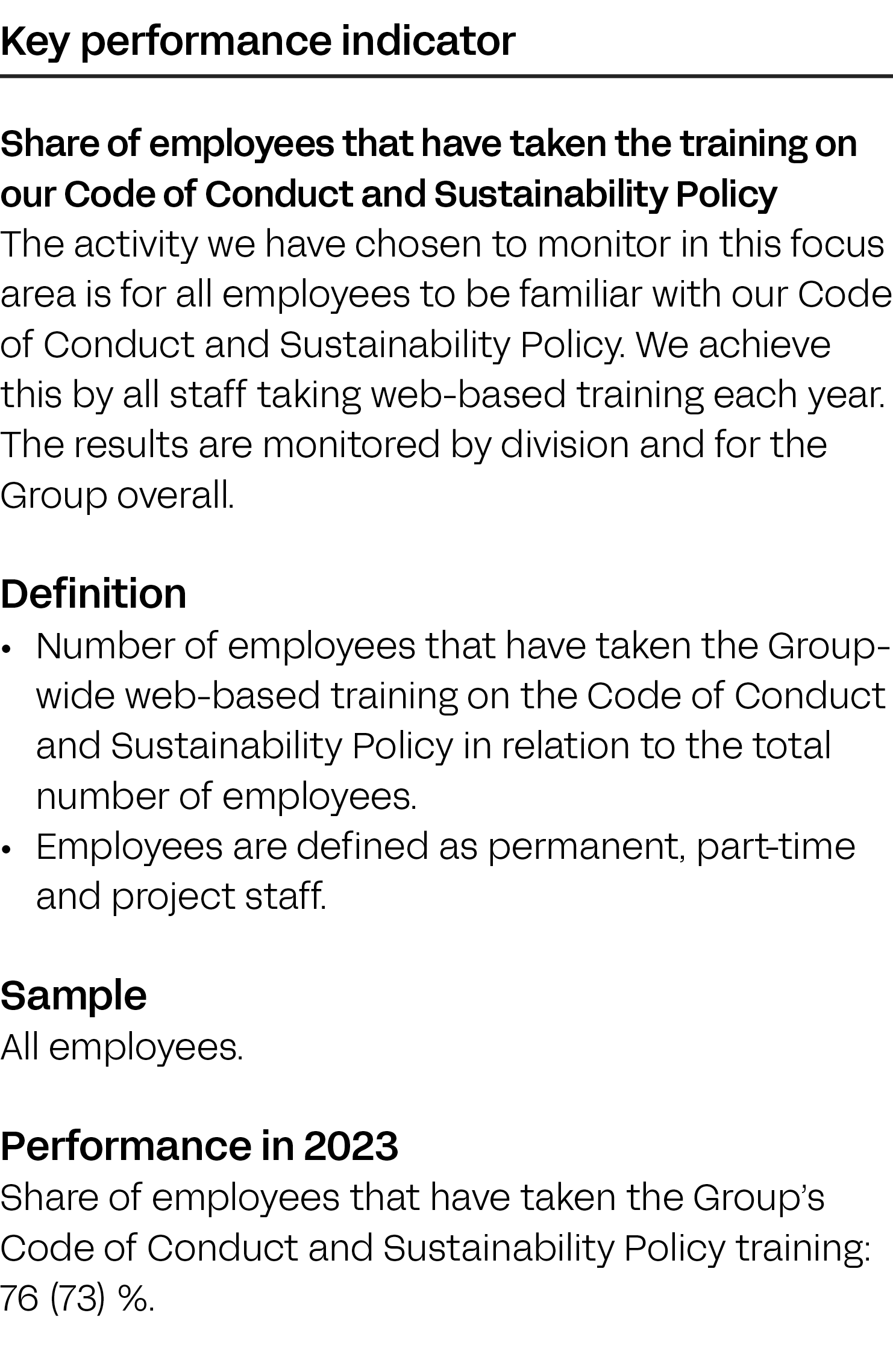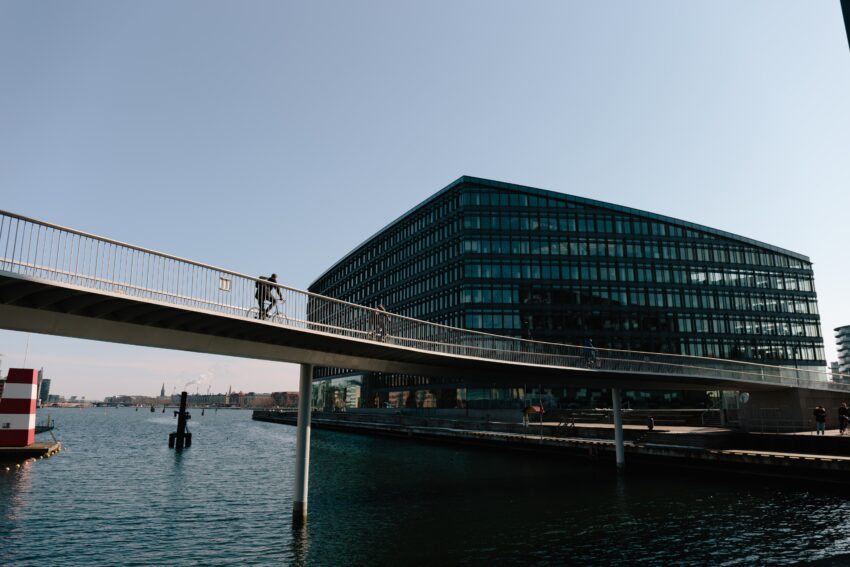Sustainability management and governance
This is Addnode Groups fifth focus area. Addnode Group has a decentralised organisational structure where responsibilities for business is delegated to divisions and subsidiaries.
Group-wide policies are implemented in each company to support internal controls and regulatory compliance.
There is a central Sustainability function that leads a forum on sustainability issues with representatives from all divisions. The Sustainability function is responsible partly for leading, supporting and monitoring the divisional implementation of our Sustainability Agenda, and partly for driving the Group’s strategic development and regulatory compliance in the sustainability area.
Sustainability function responsible for the sustainability agenda and regulatory compliance
Addnode Group has a central Sustainability function that is responsible for leading, supporting and monitoring implementation and development of the Group’s Sustainability Agenda. Formal responsibility for implementing the Sustainability Agenda rests with each division.
The sustainability function is also responsable for leading the Group’s forum for sustainability issues, with representatives from all divisions. The forum works on compliance and development and other activities within the framework of the Sustainability Agenda.
Finally, the Sustainability function is also responsable for managing the Group’s strategic development and regulatory compliance in the sustainability segment, and for ensuring that the Group satisfies external stakeholders’ expectations of sustainability reporting. In addition to the Sustainability function’s formal responsibilities, it also serves an internal coordination role. This means it coordinates Group companies and divisions on different activities, exchanging best practice or defining consistent working methods. This may also mean satisfying needs for more depth and understanding of specific sustainability issues.
Subsidiaries’ own activities
Much of the day-to-day work in the sustainability area is conducted by the Group’s subsidiaries. Our companies work on activities and initiatives based on their own assessments and assumptions of what applies to each business. Some companies have decided to ISO certify their operations in the environmental segment, others are setting goals for their share of projects that contribute to the UN SDG:s, and many companies are also taking the initiative to make various choices that consider social factors and the environment at their local workplaces. It is also common for companies to have their own business-specific codes of conduct and policy documents, including procurement policies and travel policies, that support management of their sustainability work.
Management systems and certifications
For many of our subsidiaries, certification controls how different activities are managed, and are often prerequisites for them qualifying as providers in many customer segments. At yearend 2022, the group’s subsidiaries held the following certifications:
- All TECHNIA’s major offices are ISO 9001 quality management certified and ISO 14001 environmental management certified. TECHNIA in Karlsruhe Germany, Kista, Sweden, Milton Keynes in the UK, Nieuwegein, the Netherlands and Pune, India are ISO 27001 information security certified
- Service Works Global (SWG) is ISO 9001 quality management certified, and ISO 27001 information security certified in all regions apart from the Nordics
- Decerno is ISO 27001 information security certified
- Decerno and Sokigo are FR 2000 certified, an integrated management system for quality, the environment, occupational health & safety and recruitment
Whistleblower function
Addnode Group’s whistleblower function gives everyone the opportunity to report suspicions of serious impropriety. In the first instance, we encourage staff to approach their first-line manager. If they feel unable to report the information openly, they can also report their suspicions to the Board of Directors through the Chair of the Audit Committee. Information on the whistleblower function is an element of the training in our Code of Conduct and Sustainability Policy.
The existing function was assessed in 2022 to decide the necessary changes to satisfy the new EU Whistleblower Directive, which Addnode Group will be applying effective 17 December 2023. The significant change to be implemented is a solution enabling employees to report impropriety anonymously.
Training on our code of conduct and sustainability policy
Addnode Group’s Group-wide Code of Conduct and Sustainability Policy is approved yearly by the Board of Directors, with the first version approved in 2021.
This document set a foundation for our sustainability work and day-today conduct in a number of key segments that include consideration for people, communities and the environment.
To ensure all staff are familiar with the expectations applied on them, and how we should assume collective responsibility for complying with our Code of Conduct and Sustainability Policy, all employees must take web-based training. The first launch of this package was in 2021, and it has been conducted in autumn each year since. Content is updated yearly, but the basic structure is unchanged. It has five parts:
- An introduction to sustainability and the specific issues that are current and relevant to Addnode Group’s operations
- Our five focus areas
- Our Code of Conduct and ethics issues
- Our values and corporate culture
- Our whistleblower function.
The training package takes about 30 minutes and consists of text components, interactive elements and exercises, and videos of the CEO to reinforce the content and message.
Topics we work with
- Implementation and monitoring of Group-wide Sustainability Agenda
- Regulatory compliance and reporting
- Sustainability communication
- Certifications
- Group-wide initiatives
- Training
Long-term ambitions
- Adapt reporting to the EU’s Corporate Sustainability Reporting Directive (CSRD), which is scheduled to come into effect in 2024, and the EU’s Corporate Sustainability Due Diligence Directive (CSDDD), which is scheduled to come into effect in 2024–2026
- If necessary, evaluate more development and expansion of the Group’s sustainability reporting to satisfy new internal priorities or external expectations and standards



